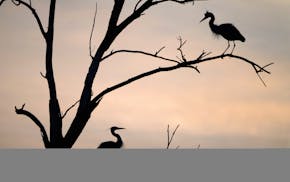Electing not to consider too seriously the early musings of the Minnesota House of Representatives is good policy, session to session. To do otherwise invites teeth gnashing, if not fear that one of the wacky ideas this bunch bats around in its initial deliberations will become law.
That said, the meanderings of Rep. Phyllis Kahn's House Legacy Committee are worthy of mention, even now in February. The responsibility of Kahn's panel is to review and ultimately pass on to the House floor funding recommendations for the arts, clean water, parks and trails, and wildlife habitat stemming from passage of the Legacy Act by voters in 2008.
As originally conceived by sportsmen and sportswomen, the Legacy Act would boost the state sales tax fractionally, attempting with the proceeds to repair a state whose wetlands, prairies, shallow lakes and forests over time had been sold to the highest bidders. Handmaidens to this skullduggery, oftentimes, were legislators themselves.
So it went for generations until hunters, anglers and other outdoors types joined in 2008 with arts, parks and trails supporters to bypass the Legislature and take their case directly to the people. Minnesotans, it was believed, would vote to tax themselves if given a chance to support what they held most dear.
Which they did. But not without a promise made concurrently by Legacy Act supporters, namely that the third of funds dedicated to fish, game and wildlife habitat would be overseen by a council dominated by citizens.
Legislators, after all, had previously usurped monies assigned to the environment (see funds tied to lottery ticket sales), and giving these same lawmakers unfettered access to so much new cash could invite similar shenanigans.
Thus was born the Lessard-Sams Outdoor Heritage Council, a 12-member group comprised of eight citizens and four legislators. Variously composed since its inception in December 2008 with members serving staggered terms, the council is government at its best, largely because of the apolitical interests of its citizen members, whose fundamental concerns lie not with backroom dealing and vote-trading, but with the environment.
Return now again to the House Legacy committee, whose chair, Kahn, has stressed on more than one occasion that the work of the Lessard-Sams Council amounts only to a recommendation about how to spend nearly $100 million in the next fiscal year -- this while acknowledging she has not recently attended a council meeting to see firsthand how it works.
"At all times, we must remember that their recommendations are just that," she has said. Context here is important, because proponents of two projects the council rejected are attempting, in an end-around, to have Kahn and her committee fund them nonetheless.
The first spurned project is little more than a brazen attempt by metro parks folks to dip into the Outdoor Heritage Fund to the tune of $6.3 million, under the guise of improving wildlife habitat on property under their administration.
Rejected for good reason by the Lessard-Sams Council, this undertaking, assuming it has merit, should be paid for by the parks and trails fund created by the Legacy Act, not the Outdoor Heritage Fund.
The second rejected project is less clear-cut, because the land and water in question are probably worthy of acquisition. But because the property would be owned by the Fond du Lac band of Chippewa, which is independent in key ways from the state, its conservation and control ultimately would lie, or could lie, apart from the state. What's more, because lands acquired with the Outdoor Heritage Fund must be open to hunting, and because many state Chippewa bands forbade wolf hunting on their lands, its purchase is problematic.
Yet notwithstanding the specific qualifications of these or other projects, the greater concern for the state, and for voters who approved the Legacy Act, is that money flowing from the Outdoor Heritage Fund for fish, game and wildlife habitat be fundamentally funneled through the Lessard-Sams Council, acting on behalf of the citizenry.
The Senate so far has abided by this pact, however implicit, and will again this session. Similarly, Gov. Mark Dayton and, before him, Gov. Tim Pawlenty, have left the council's recommendations fairly untouched. Dayton, in fact, has publicly pledged to sportsmen and sportswomen not to change the council's recommendations.
Kahn, for her part, insists her motives are well-intentioned, and that she wants only to ensure maximum efficiency of Legacy Act expenditures.
Let's say that's true.
Let's say also that in coming sessions she and other members of her committee resume their funding deliberations by showing they actually understand the work, effort and reasoning of the Lessard-Sams Council -- reminding themselves in the process why voters approved the Legacy Act in the first place.
Dennis Anderson • danderson@startribune.com
Anderson: Anglers protesting tough new Mille Lacs rules are wrong

Anderson: Courts, not politicians, should rule on Red Lake, White Earth lands

Anderson: Multimillion windfall gets invasive carp deterrent moving
![A young whitetail deer searches for food as another blanket of snow coats the arrowhead. ] Minnesota -State of Wonders, Arrowhead in Winter BRIAN PETE](https://arc.stimg.co/startribunemedia/WK32UWWY6FKNWJUIYCJ6ZPT4AU.jpg?h=91&w=145&fit=crop&bg=999&crop=faces)
Anderson: In NE Minnesota, DNR staff, habitat and deer all decline

